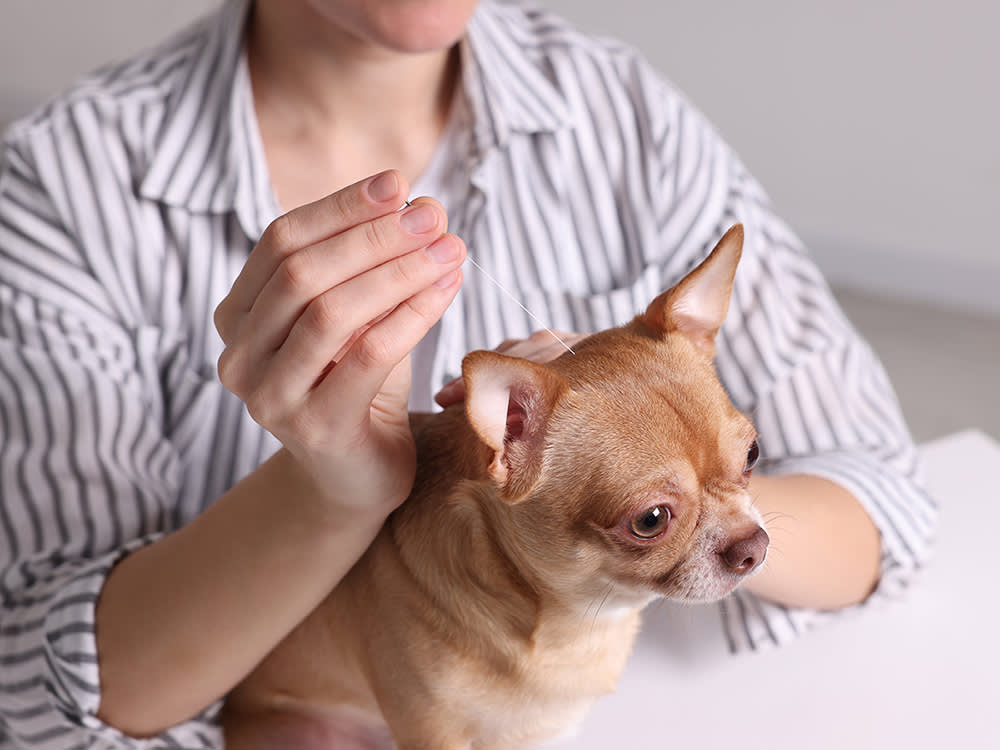Can Dogs Get Acupuncture?
Find out if this complementary and alternative medicine is right for your pup.

Share Article
There are plenty of people who are skeptical about the effectiveness of acupuncture on their own bodies, though the ancient practice has been scientifically studied for its incredible physical benefits for many decades. And, it turns out, it can really help your pet, too.
Holistic care for pets has become more widely accepted as a treatment option by vets, especially amongst surgery, oncology, and aging internal medicine patients. Acupuncture for dogs is one of the cornerstones of holistic veterinary treatment and an integral part of an all-embracing approach to therapy.
Below, learn about the overall concept of holistic veterinary medicine, what acupuncture treatment in veterinary medicine entails, and how acupuncture can augment your pup’s wellness plan.
What is alternative medicine?
First, let’s begin with complementary and alternative medicine (CAM). CAM is a term used as an umbrella for a restorative approach to medicine that includes Traditional Chinese Medicine, chiropractic, massage, homeopathy, and essential oils.

Traditional Chinese veterinary medicine works to diagnose and treat animals as a whole, rather than focusing on individual organ systems. The basic concept is the belief that illness can develop when the body is out of balance. Ultimately, the goal of traditional Chinese veterinary medicine, such as acupuncture, is to put the body back into its natural equilibrium, as a way to help to treat and rid the body of disease. This can be achieved with a combination of acupuncture, herbs, nutrition, and massage.
Usually when one thing is wrong, it can set off issues throughout the body and even the mind. Looking at a sick dog’s entire health profile considers everything about them, which can feel much more personal and healing when you’re standing in the vet’s office.
Is acupuncture good for dogs?
Acupuncture is the stimulation of a specific point on the dog’s body, known as the acupoint, which creates a “balancing” effect. Acupuncture has been practiced in both animals and humans for thousands of years in China. Ancient Chinese practitioners have discovered 361 points in humans and 173 acupuncture points in dogs.
Stimulation of these acupoints induces the release of natural chemicals such as beta-endorphins, serotonin, and other neurotransmitters. These chemicals, in turn, have positive effects on pain control and can generate the feeling of general wellbeing.
All those needles! Does it hurt?
Don’t be freaked out by how acupuncture looks from the outside — for the patient, the pain is basically a non-issue. Acupuncture treatments can cause the sensation of pressure, tingling, or aching, but even these are generally mild. For most dogs, placing the acupuncture needles is painless.
Some pets might occasionally feel the initial insertion of the needle, but once in place, there is no pain. In fact, many dogs become relaxed, and some even fall asleep. This is a desired response and is a representation of Qi, or energy, in the body. Acupuncture needles are sterile, single-use needles that are very fine and are not expected to cause discomfort. This is very different from the shots you had to put your pup through before they could come out of quarantine in early puppyhood.
What conditions can acupuncture be used for?
Acupuncture therapy can be effective with many dog medical conditions. Here are some of the most common ones:
Musculoskeletal problems
Acupuncture for dogs works well when treating arthritis, muscle soreness, back problems, degenerative joint disease, and intervertebral disc disease.
Gastrointestinal disorders
Another area where acupuncture can provide benefits for your dog is GI issues like diarrhea, vomiting, and constipation.
Neurological disorders
Acupuncture also works well for dogs with neurological problems. Veterinarians can provide acupuncture treatments for seizures and weakness of limbs.
Chronic conditions
For dogs suffering from chronic conditions like asthma, kidney disease, liver disease, hypothyroidism, hyperthyroidism, diabetes, skin disease, allergies, and heart disease, acupuncture may provide some benefits.
Cancers and immune-mediated diseases
Benefits include improvement in the immune system, decreased symptoms of cancer, like loss of appetite, pain, vomiting, diarrhea, weakness, and the alleviation of side effects of chemotherapy. It is sometimes even used as the primary therapy for the cancer itself.
Following surgery
Surgery is considered an “acute trauma,” and acupuncture for dogs is wonderful at treating associated pain and inflammation.
How many acupuncture treatments are needed?
That really depends. The number of acupuncture treatments your dog needs depends on the nature, severity, and duration of the disease. One or two treatments may be enough for a suddenly developed condition, whereas chronic conditions will often require three to six treatments to obtain results.
Some degenerative conditions may need monthly treatments over time. Treatments may be given once a week to once every few months, depending on the specific problem. Each treatment can take 20 to 60 minutes, and practitioners use an an average of 10 to 20 acupuncture needles.
What does acupuncture for dogs cost?
If you’re considering acupuncture therapy for your dog, you’ll be happy to know that some pet insurances cover the treatment. The cost for dog acupuncture treatments ranges from as low as $60 per session to as high as $300, depending on many factors including what condition is being treated and how long the treatment lasts.
What are Chinese herbs and are they safe?
Chinese herbal therapy is another method of treatment in traditional Chinese veterinary medicine, and can be safely used in conjunction with other Western medications. The use of Chinese herbs, along with acupuncture, can be a very useful and safe method to treat illnesses. Whereas acupuncture affects the movement of Qi, Chinese herbs improve the quality of Qi. This treatment combination can be very effective in bringing the body back to a balanced state.
The individual herbs are often derived from portions of plants, like their roots, bark, flowers, or seeds, but they can also be mineral or animal. Picture things like shells or earthworms as ingredients. Nothing your dog hasn’t picked up on a walk at some point.
The marriage of Eastern and Western medicine reflects many advancements in care, and so much can be done for our pets to help improve their quality of life. Consider every option and see your dog as wholly as holistic medicine does.

Dr. Shea Cox, DVM, CVPP, CHPV
Dr. Shea Cox is the founder of BluePearl Pet Hospice and is a global leader in animal hospice and palliative care. With a focus on technology, innovation and education, her efforts are changing the end-of-life landscape in veterinary medicine.
Related articles
![A woman with long dark hair kneeling to feed her Shiba Inu dog from stainless steel dog bowls]()
Some Like It Hot—The Benefits of Warming vs. Cooling Diets
Here’s how certain foods can balance your pet’s energy and even ease their allergies, according to Chinese medicine.
![Redhaired woman holding her Rhodesian ridgeback dog]()
How to Treat Epilepsy in Your Dog Holistically
Watching your pet suffer a seizure can make you feel helpless. We asked three veterinarians to weigh in on natural remedies that show promise.
![Woman in white scrubs sitting in a garden space with her two brown dogs looking up at her]()
8 Holistic Brands Curated by Integrative Veterinarian Dr. Lindsey Wendt
The founder of Crystal Lotus Veterinary Care recommends therapeutic platters, healing pet foods, electromagnetic flea/tick preventatives, and more personalized pet care options.
![Dog sitting in a tent surrounded by candles and crystals]()
Alternative Therapies Can Zen Out Your Pet, Too
Wellness treatments like acupuncture, Reiki, and sound baths are helping pets heal and bond with their parents.




